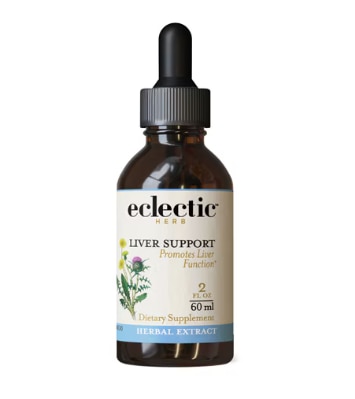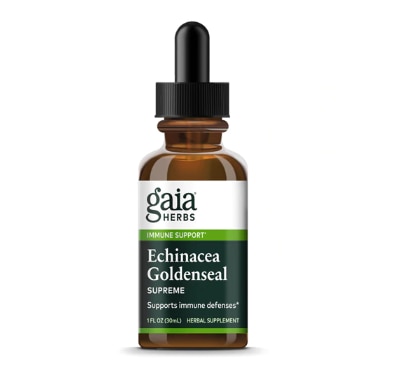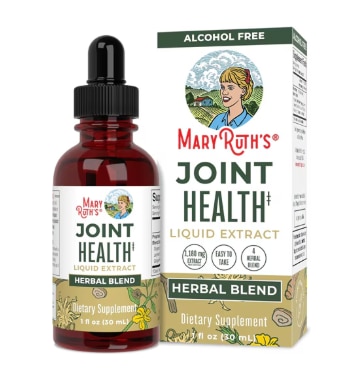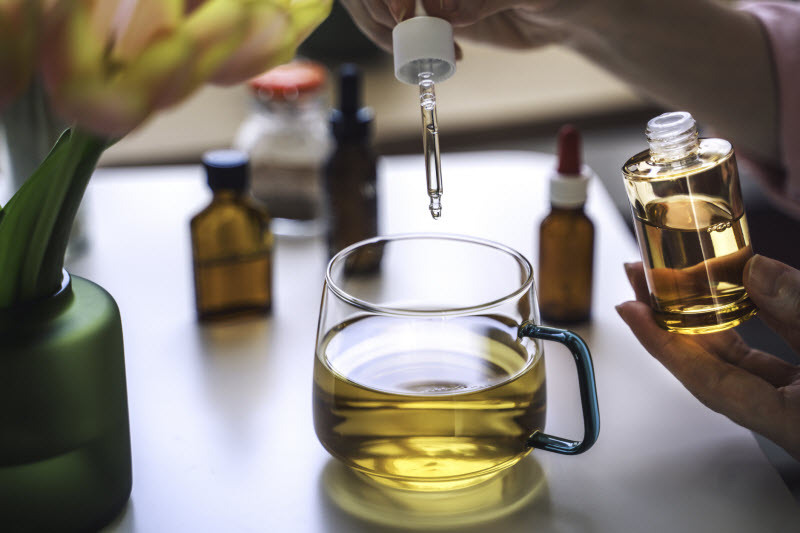Do herbs and botanicals play a role in your daily wellness regimen? If so, you may already be familiar with herbal extracts. If not, it is worth learning more about this form of natural plant medicine.
What are herbal extracts?
An herbal extract is a concentrated distillation of the beneficial compounds―phytochemicals―that have been obtained from the inert structural material of a specific plant. These active compounds are responsible for the therapeutic effects associated with various herbs.
How are herbal extracts prepared?
Phytochemicals are thought to be absorbed by the body most efficiently when they are in liquid extract form, because once extracted from the plant matrix, they bypass the need for digestion. Herbal extracts are made by soaking, or macerating, fresh or dried plant material in a solvent, such as alcohol, water or oil, to dissolve the plant’s active components. After extraction, the strained liquid is a pure, potent form of the herb. A typical herbal extract contains a 1:1 ratio of herb to liquid.†
With herbal tinctures, the solvent is usually alcohol, whereas most herbal extracts are prepared with water, oil or glycerin, which is a simple sugar alcohol that appears as a colorless, odorless, viscous liquid with a sweet taste. Glycerin-based herbal extracts are also called glycerites. One reason people may prefer water or glycerin-based herbal extracts is because extraction processes involving the use of alcohol or solvents may leave residues in the final product.
How can you ensure a high-quality product?
Since quality and efficacy can vary among brands, both consumers and manufacturers are increasingly demanding full disclosure of information, starting with how an extract is produced. A key differentiator is the portion of the plant that is represented. Full spectrum is a phrase to look for, as this means you will be obtaining a wide range of valuable, bioactive compounds in their natural proportions, as opposed to a single bioactive element.
You might also opt for brands with a vertically integrated production model, which means that a company maintains control over every step of the process―from cultivation to delivery―which helps to ensure what is called end-to-end traceability. This supply chain management allows companies to have full control over quality, sustainability and consistency from harvest to the final product.
What else should you look for in an herbal extract?
Another marker of a high-quality herbal extract is proper certifications, which reflect commitment to quality, safety, and regulatory compliance. Reputable manufacturers and suppliers invest in third-party audits and testing.
A few to look for are:
- Food Safety & Special Dietary Certifications, including Non-GMO, Gluten-Free, SQF, BRC, FSSC, Kosher, Halal and BSCG.
- Good Manufacturing Practices (GMPs) refers to brands with credible third-party GMP certifications (USP, NSF, UL-NPA, WHO).
- Food Safety Modernization Act (FSMA) is a broad U.S. law aimed at preventing foodborne illnesses by shifting from a reactive to a proactive approach to food safety.
- The Foreign Supplier Verification Program (FSVP) is one of FSMA’s key provisions, which places the responsibility on U.S. food importers to ensure their foreign suppliers meet U.S. food safety standards.
What are the different types of herbal extracts?
As detailed in an extensive medical study, there are various classifications of herbal extracts, including single and combination preparations. Given their liquid form, herbal extracts are believed to deliver a stronger dose of the beneficial properties of various herbs than what could be obtained from them in either a fresh or dried form.†
Are herbal extracts available in other forms than liquid?
While herbal extracts are traditionally prepared with liquid, they are also available in capsules, powders, teas, creams and lotions. Topical forms give you the option of applying extracts to your skin directly or adding them to the bath for soothing herbal therapy.
Which herbal extracts are best for specific needs?
Herbal extracts have been cherished for centuries for their ability to positively support many aspects of our physical, mental and emotional wellbeing―naturally.†
Some of the most popular herbal extracts include:
Turmeric with black pepper
This extract is widely favored, and with good reason, as turmeric, largely activated by black pepper, has been extensively studied for its potential role in supporting a healthy metabolism and a normal inflammatory response in the body, among other benefits.†
Green tea
Research suggests that green tea is rich in antioxidants and polyphenols, particularly the catechin epigallocatechin gallate (EGCG). Green tea extract appears to support healthy blood sugar already within normal range and healthy cognition.†
Peppermint
With its relaxing effect on the muscles of the digestive tract, peppermint extract may be particularly supportive of gut and digestive health, according to one research team evaluating nine different medical studies.†
Fennel
Believed to be one of the oldest medicinal herbs, fennel has been used around the world for centuries to support digestive and immune health, findings also validated by American scientists. Additionally, fennel contains antioxidants that support a normal inflammatory response in the body.†
Ginger
This heat-generating spice has long been appreciated and relied upon in Ayurveda, the East Indian wellness system, as well as Traditional Chinese Medicine (TCM). Antioxidant-rich, anti-inflammatory ginger has been shown to support healthy digestion and overall gut wellbeing.†
Licorice root
This antioxidant-dense, sweet-tasting root may help support the wellbeing of the stomach and digestive tract. Licorice extract also is a source of a natural compound called glycyrrhizin which supports a normal inflammatory response in the body.†
Valerian
Extracts prepared from this root are believed to support healthy sleep and normal digestion. Valerian extract has also demonstrated potential in supporting the body in the face of chronic stress.†
Reishi mushroom
This mushroom has long been relied on in China to help manage a variety of health imbalances. Among other beneficial actions, research suggests that reishi extract may help support healthy immune function, including both cellular immunity and humoral immunity.†
Now that you know what to look for in an herbal extract, and the many benefits these products appear to offer, you might want to explore a wider range of these botanical options to enrich your home-based pharmacopeia.
†These statements have not been approved by the Food and Drug Administration. These products are not intended to diagnose, treat, cure or prevent disease.
Featured Products



The post The Quest for Quality: What to Look for in Herbal Extracts first appeared on The Upside by Vitacost.com.

